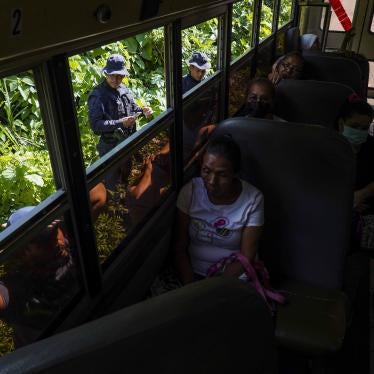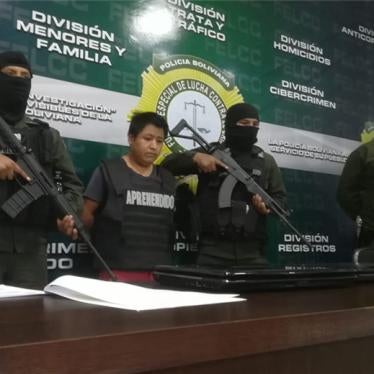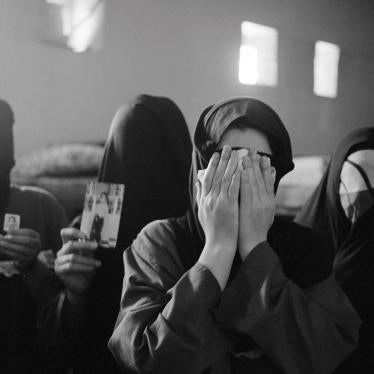Since the collapse of the corrupt Fujimori government in November 2000 the human rights situation in Peru has improved significantly. During Fujimori's last term in office (1995-2000), Vladimiro Montesinos, the de facto head of the National Intelligence Service (SIN) and a close Fujimori advisor, used a combination of bribes and extortion to control state institutions such as the armed forces, the police, the tax office, the electoral authorities, and the judiciary. Human rights abuses, including extrajudicial executions, torture, and intimidation occurred frequently and were systematically covered up.
Recent steps to strengthen human rights protection in Peru have been part of a wider effort to restore the rule of law. The administration of President Alejandro Toledo has built on the advances of the interim government in investigating abuses and holding those responsible accountable. It is also making a longer-term effort to restore the independence of the judiciary and restructure the armed forces. Other long-standing human rights problems, such as police brutality and overcrowded and unsanitary prisons, are also beginning to be addressed.
A Fujimori legacy that the government so far has not tackled is the country's draconian and much criticized anti-terrorism legislation. Nor has it yet remedied the situation of some 2,500 prisoners convicted by anti-terrorism courts without due process or the right to a defense.
Accountability for crimes committed under Fujimori and Montesinos
Special prosecutors attached to the Ministry of Justice are now investigating a wide universe of crimes committed under the Fujimori government, including corruption, drug-trafficking, and human rights abuses. The latter include both abuses committed in the context of Peru's counter-insurgency war and those that have been attributed directly to Fujimori, Montesinos, and their political and military cronies. Montesinos is currently in detention in the naval base of Callao, and at least fifteen generals are in jail or under house arrest, including a former army commander-in-chief, Gen. Nicolás de Bari Hermoza Ríos, who is charged in connection with the 1991 Barrios Altos massacre. They are among forty-three military officers who currently face criminal prosecution. Also charged are nineteen members of the "Colina Group," a death squad set up by Montesinos in the early 1990s to secretly eliminate key terrorist suspects, which also harassed and intimidated independent journalists and opposition politicians. Ten former alleged Colina Group members are in detention or under house arrest.
The arrest and prosecution of these former officials is consistent with a ruling by the Inter-American Court of Human Rights that found that the sweeping amnesty law passed by the Fujimori-controlled Congress in 1995 violated the American Convention on Human Rights. The military justice authorities have already barred the application of the amnesty to two massacres in which the Colina Group was involved, the 1991 Barrios Altos case and the 1992 La Cantuta case.
The criminal prosecution of former President Fujimori is also proceeding apace. The Peruvian Congress stripped Fujimori of his immunity as former head of state last year and, in September 2001, the attorney general filed charges against him in two massacres (the Barrios Altos and La Cantuta cases). Fujimori, now resident in Japan, also faces prosecution for giving Montesinos a severance payment of $15 million for "services to the nation." Arrest warrants have been forwarded to Interpol in both cases, and Peru is expected soon to formally request Japan to extradite Fujimori.
Truth commission
In parallel with prosecutorial efforts, Peru has formed a Commission of Truth and Reconciliation to investigate and document the political violence and counterinsurgency abuses that took place between 1980 and 2000. The commission is expected to present a written report to the government in February 2003. It will shortly begin a series of public hearings in rural areas affected by the armed conflict.
Justice and prison reform
Progress toward reforming Peru's judiciary, crippled by years of corruption and neglect, has been slow. Several judges from the Fujimori era, as well as a former attorney general, are facing criminal proceedings. As in many Latin American countries, the justice sector as a whole is underfunded. To combat corruption and attract better-qualified members, the government has increased the pay of judges. It is trying to speed up the training and appointment of tenured incumbents to replace provisional judges who are still numerous, particularly in rural areas.
Prison conditions remain harsh, with severe overcrowding and unsanitary conditions in some prisons. Yet there have been some improvements since the end of the Fujimori government. Prisoners convicted of terrorism, who previously were kept locked in their cells all day and were allowed few visits, are now held under the same conditions as other prisoners.
Draconian anti-terrorism laws, unfair trials, and innocents in prisons
Peru is currently holding about 2,500 prisoners convicted of or indicted on charges of terrorism or treason. Many were tried by anti-terrorism courts, civil and military, whose judges were often hooded to prevent their identification, in speedy court proceedings in which the right to a defense was severely restricted. (These "faceless" courts were abolished in October 1997.) The laws under which prisoners were charged, introduced by decree after Fujimori's "self-coup" in 1992, are vaguely worded and allow courts to send people to prison for long periods for ill-defined offenses such as "affecting international relations," "provoking anxiety" or justifying terrorism (apología del terrorismo).
Fujimori acknowledged that the antiterrorist courts had convicted hundreds of innocent people, and he set up an ad-hoc committee to recommend cases for a presidential pardon. Since Fujimori left office in November 2000, the recommendations of a Justice Ministry committee, which inherited the work of the ad-hoc committee, have resulted in the release of more than two hundred wrongly convicted prisoners. But at least eighty cases forwarded to the committee by human rights groups and the Church have yet to be considered.
The Inter-American Court of Human Rights has ruled that Peru should grant a new trial to four Chileans sentenced to life imprisonment for treason as alleged members of the Túpac Amaru Revolutionary Movement (Movimiento Revolucionario Túpac Amaru, MRTA) guerrilla group. The new civilian prosecution is currently at the pretrial stage. Lori Berenson, an American citizen convicted of treason in a military court in 1996, was also recently retried in a civilian court. (Human Rights Watch will be releasing a separate backgrounder on this case.) No measures, however, have been proposed to deal with the demands for a retrial of the remaining prisoners convicted under the same laws, scores of whom were recently on a nation-wide hunger strike. These prisoners also have a right to a fair trial.
Human Rights Watch believes that the government should ensure that such prisoners are retried in impartial civilian courts with rights to due process of law. Defendants must have adequate access to counsel in private; counsel must enjoy access to evidence equal to prosecutors; evidence obtained under duress must be held inadmissible, and convictions must be based on precisely defined and recognizably criminal offenses.
Nor have Peru's politicians moved to amend the draconian anti-terrorism legislation inherited from Fujimori. Yet, in what may be a step in the direction of reform, anti-terrorism judges now claim to interpret the laws in such a way as to avoid the widespread abuses of the past.






